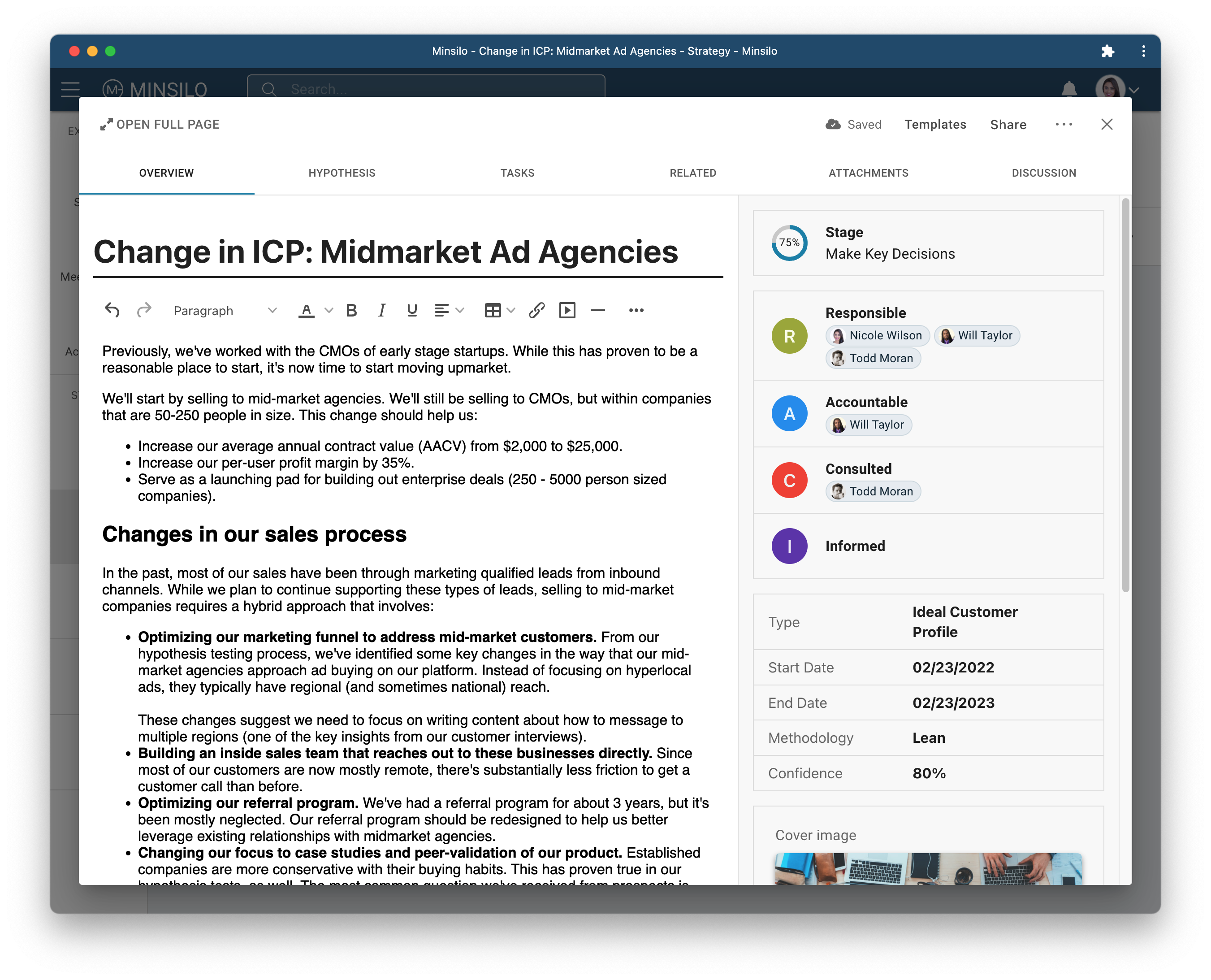We’ve been helping startups build and launch their tech offering since 2017.
Although Good Air Software is new as a consultancy, our principal Ryan Leaf has been helping startups for the past eight years build and launch their tech product.


Corpora Text Editor
Minsilo, Inc. · New York · March 2022
Corpora is a markdown-enabled, collaborative, real-time document editor (a la Google Docs or Notion) that was built for Minsilo.
Challenge: the goal of Corpora was to replace TinyMCE with a collaborative, multiplayer editor that supported multi-page documents.
Solution: build a new rich-text documents platform using Tiptap and Hocuspocus, along with a custom block-based data model and architecture.
Key Deliverables
- Data migration tool to move HTML-based documents from TinyMCE to the Prosemirror JSON format.
- Extend Minsilo’s file attachment uploader to integrate with Prosemirror and add support for image and video attachments.
- Design and implement a block-based document model that is extensible, using a plugin pattern, and which can support integrating off-the-shelf block components (e.g. draw.io / Excalidraw).
- Implement a number of initial block types, including: images, videos, code, and rich text (using Tiptap).
Key Learnings
Building Corpora was a significant undertaking. We learned a lot during this project, including:
- The complexity of document rendering across platforms. Structured schema-based document models, like Prosemirror, are typically a better choice than HTML/Markdown.
- Multiplayer libraries like Y.js (and backends like HocusPocus) only solve data synchronization between active participants in a document. These libraries are stateless, meaning the documents’ state needs to be persisted elsewhere.
- Persistence of data has several considerations, including whether it’s best to have a backend agent listen for changes to the real-time clients. Two potential solutions are: invoking a client on the server that watches the document and interacts with browser users (and thus tracking and assembling all of the diffs from Y.js); or electing a specific client to be the “leader” and relying on them to upload the entirety of the document in a JSON format to a backend.
- Clients still need to interface with a backend that can give them the whole document on page load (or when the connection is interrupted). Although Y.js produces a collection of updates diffs that can be applied in any order to re-assemble the document, it is less reliable to rely on these for initial document loading.
Technologies Used
Corpora is built on top of several technologies, including Ruby on Rails, React + React Context API, ActionCable, Tiptap, HocusPocus and Y.js.

“We’re a few months in to the Glammatic launch and it’s been going well! Your ICP doc has played out pretty much exactly according to plan… I just used it during an employee onboarding session.”
AMEET KALLARACKAL
CEO, Fisherman TechnologiesFebruary 2024
Glammatic
Fisherman Technologies · Boston · January 2022
Glammatic is a digital marketing agency focused on the needs of salons.
Challenge: after COVID saturated the restaurant-tech business, Fisherman pivoted to a new go-to-market strategy focused on salons and the beauty & wellness industry.
Solution: Build the Glammatic brand to focus on the digital marketing needs of salons.
Outcome: As of February 2024, using the Ideal Customer Profile developed by principal Ryan Leaf, Glammatic had achieved product-market fit in the salon industry.
Key Deliverables
Our principal Ryan Leaf worked alongside Fisherman’s head of marketing to:
- Work as the company’s first interim head of product.
- Develop a clear go-to-market strategy based on extensive research through direct customer interviews, analyzing sales calls, and engaging directly with the sales team to understand latent and surface-level marketing needs.
- A robust Ideal Customer Profile (ICP) definition, including customer and user personas to guide the sales and engineering teams.
- Rally Fisherman’s sales and growth teams around the new strategy.
- Prototype a new social media management product offering.
- Lead a contract designer to build website templates and designs that led to a high conversion rate for salon owners (based on the discovery that salons are highly design and image conscious).
- Worked with the CTO to develop and prioritize a clear product roadmap that focused on quick wins to enable the sales team to test and validate the market.
- Launch a marketing website alongside Glammatic’s director of marketing, including extensive product marketing copywriting.
Major Challenges
Launching a completely new brand and pivoting Fisherman’s technology product to focus on the salon market was a considerable undertaking.
- Aligning an existing team around the right market opportunity while pivoting. One of the most common challenges startups face is being radically focused on a single customer type, rather than trying to “boil the ocean” from a sales, marketing, and engineering perspective.
- Cutting through the noise. Whenever a startup is exploring a new market, it is imperative to stay focused on the customers and problems that drive results. Glammatic too faced this challenge: how to cut through the noise and focus on a singular market opportunity that would lead to the greatest growth potential.
- Telling the right story. In a commodity business (website hosting), telling the right story is critical to positioning and customer acquisition. Salon owners needed to know why Glammatic was the right choice for them, despite having endless options.
Tools & Technologies Used
This engagement focused primarily on product management and product marketing work. We utilized the Ideal Customer Profile and “Jobs to be Done” frameworks. We also implemented a customized RICE framework for product prioritization. Furthermore, we helped built a bespoke website in WordPress and hosted it on AWS Lightsail.

About our principal
Ryan Leaf is an experienced software developer and architect. He is the Principal of Good Air Software.
He has worked for over a decade on a wide range of projects, as well as being a tech startup founder himself.
Ryan is a true startup generalist. Beyond his extensive technical experience, he has also worked in product management, marketing, and go-to-market functions in a startup.
“Ryan’s advice and experience has assisted CollegeAI with product pricing, customer acquisition strategies, network growth, technical architecture and many other challenges that face early stage startups. Ryan is always learning and applying advice from business experts, this complements his strong technical abilities.”
SEVERIN IBARLUZEA
serial founder & founder of tscircuit~April 2018
Fisherman Online Ordering (OLO)
Fisherman Technologies · Boston · March 2020
OLO was a joint project between Fisherman Technologies and Shift4 Payments to provide restaurant owners with online ordering capabilities.
Challenge: at the onset of COVID, many restaurants were forced to rapidly adopt online ordering / delivery services to stay in business.
Shift4 Payments, the largest payment processor in the restaurant industry, asked Fisherman (our client) to build out an online ordering offering for their point-of-sale customers to use on their co-branded websites.
Solution: Good Air Software worked alongside Fisherman to deliver an initial online ordering system in a matter of 10 days.
Key Requirements
Given the limited timeline and high urgency, Good Air Software worked closely with the Fisherman team to:
- Identify and prioritize the functional and non-functional requirements of OLO.
- Aggressively descope the project, allowing the team to focus on a minimum viable product.
- Develop an initial prototype of the online ordering system (see below).
- Test and validate the implementation.
Scope
Given our time budget of 10 days to launch an MVP, we worked closely with the Fisherman team to deliver the correct product scope. This scope included:
- Developing a data schema to support tracking of menu items available for sale, checkout carts, taxes, and order history.
- Extending the online menu system that Fisherman created to include cart functionality.
- Handling common edge cases in online ordering, such as accounting for variations in price, supporting modifiers and variants.
- Properly tallying up carts and calculating sales tax.
- Integrating with Shift4’s legacy payments API.
- Recording, storing and sending receipts to both the customer and the restaurant. We implemented an email-based notification system.
Tools & Technologies Used
This engagement focused primarily on software engineering tasks. We utilized Gatsby.js, Django, Postgres, and Shift4 Payments’ API for this project.
Fisherman Automated Site Technology (FAST)
Fisherman Technologies · Boston · September 2019
FAST is an automated website generator built on top of Gatsby, Node.js, Amazon SQS, and Kubernetes.
Industries: Restaurant Tech / Web Hosting
Company Profile
Fisherman builds custom websites for busy restaurant owners. Fisherman leverages their proprietary FAST system to automatically generate great websites for restaurants across the US.
Challenge: after successfully prototyping a local CLI website generation tool, Fisherman needed a way to keep up with the demand of customers and unlock their sales team to move faster with acquiring new customers.
Solution: FAST is a custom build system that utilizes a Node.js-based daemon and an Amazon SQS queue. Whenever a customer requests a website through Fisherman’s onboarding form, a job is created in the SQS queue and then processed by the FAST worker.
Key Deliverables
Building FAST was a comprehensive and collaborative effort with Fisherman’s team. This process included:
- Evaluating Fisherman’s existing tooling and areas for improvement.
- Creating a product requirements document (PRD) and scoping out both a minimum viable product (MVP) and a longer term roadmap.
- Developing a queue processing daemon that can control and configure Gatsby’s build process.
- Implementing a GraphQL data layer and Gatsby plugin to dynamically generate the right pages based on information available in the Fisherman customer dashboard.
- Standing up an Amazon EKS-based Kubernetes cluster to run the workers and automatically scale up/down based on usage, ensuring customers receive timely updates to their websites whilst managing costs.
- Rigorous performance and load testing to ensure the FAST system could handle demand without compromising performance to customers.
Tools & Technologies Used
This engagement focused primarily on software architecture, software engineering, and DevOps tasks. We utilized Kubernetes, Node.js, Amazon EKS, Amazon SQS, Gatsby.js, and GraphQL to deliver this solution to the client.
And that’s just the beginning
We’ve been building solutions for startups for almost a decade, working intimately with founders to help them achieve their vision. We’d be delighted to share information about other projects we’ve worked on in other sectors, such as healthcare.
Disclaimer: projects dated before April 2025 were completed by our principal prior to the founding of Good Air Software. Neither our principal, nor Good Air Software have a claim of ownership to the IP rights of work performed.